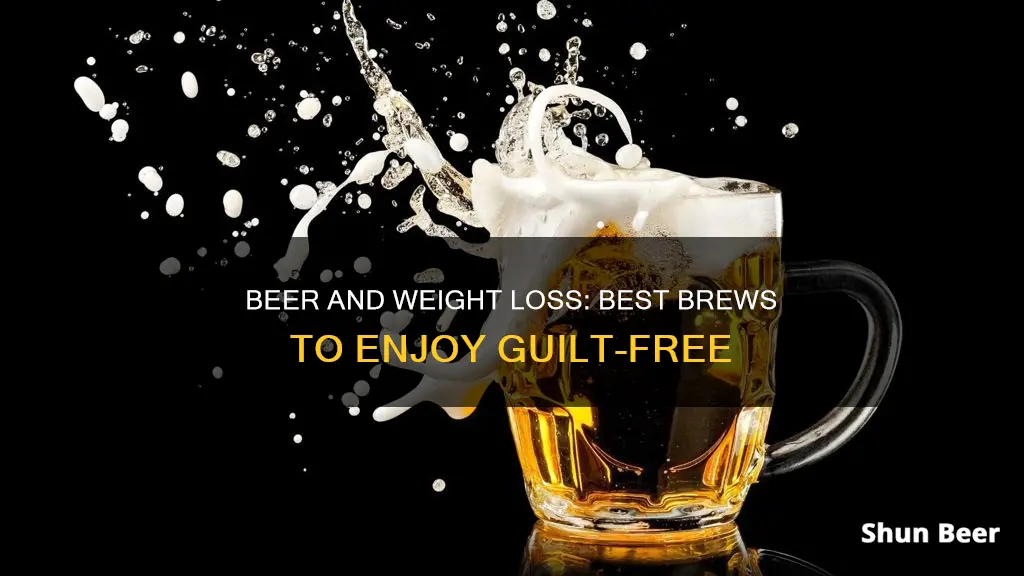
Beer and weight loss are not mutually exclusive, but it is challenging to lose weight while drinking beer. This is because beer is full of bubbles that bloat you and contains carbohydrates that can crush your low-carb eating plan. Beer also contains empty calories and doesn't provide any nutrients for your body. The higher the alcohol content, the higher the calorie count. If you are trying to lose weight, it is recommended to drink light beers with low % ABV and low calories. Some recommended brands include Budweiser Select, Miller Genuine Draft 64, and Michelob Ultra.
What You'll Learn

Light beers are best for weight loss
If you're a beer enthusiast looking to lose weight, you're in luck! While beer typically has a terrible reputation when it comes to weight loss due to its high calorie and carbohydrate content, there are definitely options out there that can help you stick to your weight loss goals. The key is to look for light beers with low alcohol content.
As a general rule of thumb, choosing “light” beers may be the best selection to adhere to weight loss goals. The greater the alcohol content, the greater the calorie count. So, sticking to light beers can help you cut down on calories. Additionally, light beers tend to have a higher level of carbonation, which can help you feel fuller and stave off hunger.
Some recommended light beers for weight loss include:
- Budweiser Select 55: 55 calories, 2 grams of carbs
- Beck’s Premier Light: 64 calories, 4 grams of carbs
- Natural Light: 95 calories, 3 grams of carbs
- Michelob Ultra: 95 calories, 2.6 grams of carbs
- Amstel Light: 95 calories, 5 grams of carbs
- Miller Light: 96 calories, 3 grams of carbs
If you're looking to treat yourself to a beer while still staying on track with your weight loss goals, opting for one of these light beers is a great choice. Just remember to drink in moderation and be mindful of your overall relationship with alcohol to ensure a healthy balance.
Beer Drinking: Weight Loss or Gain?
You may want to see also

Alcohol increases the risk of cancer and heart disease
While beer can be incorporated into a balanced diet, it is crucial to be mindful of the calorie count and alcohol content, as these factors can hinder weight loss goals. Generally, "light" beers with lower alcohol content are preferable for weight loss. However, it is important to remember that excessive alcohol consumption can have detrimental health effects.
Alcohol consumption is associated with an increased risk of various types of cancer, including cancers of the oral cavity, pharynx, esophagus, and larynx. The risk increases with the amount of alcohol consumed, and even moderate drinking can elevate the likelihood of certain cancers. Additionally, alcohol can cause damage to cells, alter hormone levels, and increase the absorption of harmful chemicals in the mouth and throat.
The consumption of alcoholic beverages has also been linked to a higher risk of heart disease and other cardiovascular issues. Heavy drinking is a contributing factor to cardiovascular disease and can lead to high blood pressure. Therefore, it is essential to drink in moderation or not at all, as recommended by health guidelines.
The combination of alcohol and tobacco use further exacerbates the risk of developing cancers, particularly in the oral cavity, pharynx, larynx, and esophagus. The effects of alcohol and tobacco are multiplicative, meaning that using both substances results in a greater risk than the sum of their individual risks.
It is worth noting that the relationship between alcohol consumption and cancer risk is complex, and there may be other factors involved. For example, alcohol can cause cirrhosis of the liver, which can then lead to liver cancer. Additionally, heavy drinking can increase the risk of infection with the hepatitis C virus (HCV), which is also linked to liver cancer.
In conclusion, while moderate beer consumption can be part of a balanced diet, excessive alcohol intake can have severe health consequences, including an increased risk of cancer and heart disease. It is important to follow health guidelines and drink in moderation or abstain from alcohol altogether to minimize these risks.
Beer and Piles: A Safe Mix?
You may want to see also

Drinking less is healthier than drinking more
Drinking less is always healthier than drinking more, especially if you're trying to lose weight. Here's why:
Alcohol and Weight Loss
Beer has a bad reputation when it comes to weight loss. It's often seen as a source of empty calories, with little to no nutritional value. These extra calories can hinder your weight loss goals, especially if you're not careful about your overall calorie intake. Additionally, beer is known to be carbonated and can cause bloating, which is not ideal when trying to shed pounds.
Calorie Content and ABV
The calorie content in beer varies, and it's not always easy to determine which beers are high or low in calories as this information is not always readily available. However, a good rule of thumb is that the higher the alcohol content, or ABV (alcohol by volume), the higher the calorie count. So, if you're watching your weight, opting for light beers or low-ABV beers can be a better choice.
Impact on Metabolism
Alcohol can also impact your metabolism, making weight loss more challenging. When you consume alcohol, your body prioritises removing it as a toxin, which can cause a decrease in fat burning. This means that other calories you take in, whether from the beer itself or from food, are more likely to be stored as fat.
Drinking Less is Key
To summarise, drinking less is definitely healthier when trying to lose weight. Here are some tips to help you reduce your beer intake:
- Opt for light beers or low-ABV options when you do drink.
- Reduce your portion sizes by using smaller glasses or choosing cans over bottles.
- Drink less frequently, such as only on weekends.
- If you're cutting carbs, choose lower-carb beers.
- Alternate between beer and sparkling water to stay hydrated and drink less alcohol overall.
- Be mindful of your food choices when drinking, as alcohol can lower inhibitions and lead to unhealthy decisions.
Chicago Beach Beer Drinking Rules Explained
You may want to see also

Drinking beer in moderation won't stop weight loss
It's a common misconception that drinking beer will automatically hinder your weight loss journey. While it's true that beer can be calorie-dense and contribute to weight gain, drinking in moderation and making mindful choices can help you continue losing weight without giving up the occasional beer. Here's how:
Choose Lower-Calorie Beers
Opt for light beers or those with a lower alcohol content. Generally, the higher the alcohol content, the higher the calorie count. Some lower-calorie options include:
- Budweiser Select 55
- Beck's Premier Light
- Natural Light
- Michelob Ultra
- Amstel Light
- Miller Light
- Budweiser Select
Practice Portion Control
Reduce your portion size by using a smaller glass or choosing a 12-ounce can instead of a 16-ounce bottle. This simple switch can help you cut down on excess calories.
Drink Less Frequently
Instead of drinking every day, limit your beer consumption to weekends or special occasions. This will reduce your overall calorie intake and help you stay on track with your weight loss goals.
Be Mindful of Food Choices
Beer often falls under the category of empty calories, and it can increase cravings for unhealthy foods. Plan your meals ahead of time, especially if you know you'll be drinking beer, to avoid making unhealthy food choices that can hinder your progress.
Alternate Between Beer and Water
A clever trick to reduce your overall alcohol consumption is to alternate between beer and sparkling water or club soda. This will keep you hydrated, slow the absorption of alcohol, and ultimately reduce the number of calories you consume.
Remember, drinking in moderation is key. For men, moderate drinking is typically defined as 1-2 drinks per day, and for women, it's up to one drink per day. By incorporating these strategies into your routine, you can continue to lose weight while still enjoying the occasional beer.
Beer and the Flu: A Safe Mix?
You may want to see also

Calorie content is determined by ABV and carb content
Calorie content in beer is determined by its ABV (alcohol by volume) and carb content. The higher the ABV, the higher the calories. Beer is primarily water by weight and volume, but most of the calories in beer come from alcohol, with a small amount coming from unfermented carbs and protein.
When choosing a beer, it is best to opt for "light" beers with lower ABV and fewer carbs. These tend to be lower in calories. For example, Budweiser Select 55 contains 55 calories and 2 grams of carbs, while Budweiser regular contains 40% more calories. Other low-calorie options include Beck's Premier Light (64 calories, 4 grams of carbs), Natural Light (95 calories, 3 grams of carbs), and Miller Light (96 calories, 3 grams of carbs).
It is worth noting that regulators do not require calorie information on beer containers, so it can be challenging to determine the exact calorie content of a beer. Additionally, alcohol can impact metabolism and lead to poor food choices, which can hinder weight loss. Therefore, drinking in moderation and treating alcohol as a treat are important when trying to lose weight.
Beer Drinking and Puffy Faces: Is There a Link?
You may want to see also
Frequently asked questions
Yes, but it is harder to create a caloric deficit if you drink every day. If you are trying to lose weight, try to reduce your calorie intake by drinking light or low % ABV beer, reducing your portion size, and drinking less frequently.
Some beers that are lower in calories include:
- Budweiser Select 55
- Beck’s Premier Light
- Natural Light
- Michelob Ultra
- Amstel Light
- Miller Light
- Budweiser Select
- Corona Light
- Heineken Light
Some beers that are higher in calories include:
- Sierra Nevada Bigfoot Ale
- Leinenkugel’s Berry Weiss
- Budweiser American Ale
- Sam Adams Boston Lager
- Guinness Extra Stout
- Sierra Nevada Pale Ale
- Harpoon IPA
- George Killian’s Irish Red
Beer can affect your weight-loss journey in several ways. Firstly, beer is high in calories and carbohydrates, which can hinder your progress if you are not careful. Additionally, drinking beer can lead to poor food choices as alcohol lowers inhibitions and cravings for fried, cheesy, and carb-heavy foods increase. Finally, alcohol can disrupt your sleep patterns and metabolism, making it more challenging to lose weight. Therefore, it is important to drink in moderation and be mindful of your overall calorie intake.







